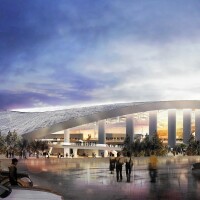Documents Show How Inglewood Clippers Arena Deal Stayed Secret

Inglewood city officials were secretly negotiating an agreement to build an arena for the Clippers basketball team for months before giving a carefully guarded notice to the public, according to newly released documents.
Now there is a request for the Los Angeles District Attorney’s Office to investigate.
Residents learned about the project on June 15, 2017, at a special meeting of the city council. The documents suggest that backers of the arena may have purposely used a special meeting because it required just 24 hours public notice, while a regular meeting requires 72 hours notice. The meeting agenda didn’t mention the arena or the Clippers, but gave an obscure name of a related company negotiating the deal.
A judge ordered the documents be made public earlier this month as part of ongoing litigation involving the city and a community group. The Inglewood Residents Against Taking and Eviction, or IRATE, is suing Inglewood, claiming the city did not follow the California Environmental Quality Act, or CEQA, before it approved the exclusive negotiating agreement to build the arena.
On Thursday, Doug Carstens, an environmental attorney representing IRATE sent a letter to the Los Angeles District Attorney Jackie Lacey asking her office to investigate the city for intentional Brown Act violations. The Brown Act is a state law guaranteeing the public’s right to attend meetings held by local legislative bodies.
“These actions are exactly contrary to the government openness and transparency purposes of the Brown Act and the California Environmental Quality Act,” said Carstens.
The state’s oldest environmental law, CEQA, requires local and state agencies to do environmental reviews before approving certain projects. An environmental impact report evaluating the arena is currently underway, according to city officials. Should the project be approved, some local business owners and residents have voiced concern the city may use eminent domain to acquire property to develop the arena.
Carstens sought documents, including emails, related to the agreement. The city had argued the emails were protected by attorney-client privilege. Los Angeles Superior Court Judge Amy Hogue partially disagreed and ordered attorneys defending Inglewood to release over 200 pages of draft agreements and emails Monday.
In an April 2017 email from Royce Jones, an attorney for Inglewood, to Chris Hunter, the attorney negotiating for the project, Jones confirms a draft of the agreement was prepared based on discussions earlier in the month with Mayor James Butts and “certain other City and Clipper representatives.”
IRATE contends that the documents show the secrecy was maintained illegally.
In a June 9 email, Hunter asked Jones if the agreement must be part of the city council’s public agenda or could be downloaded “shortly before the meeting” because his client wanted to reach out to “various players.” Jones responded that the agreement must be part of the agenda and “that is why we elected to just post 24 hours versus the normal 72 hours.”

Hunter added that the entity he is representing “will have a generic name so it won’t identify the proposed project.” Residents would see only that the meeting involved Murphy’s Bowl LLC, an entity formed in January 2017 in Delaware. It has one member, Steven Ballmer, the owner of the Clippers, according to court records.
The Inglewood City Council’s regular meetings are held on alternate Tuesdays, but there wasn’t one on Tuesday, June 13. Instead, there was a special meeting on Thursday, which only required the agenda to be posted 24 hours in advance.
The timing is more than suspect, Carstens believes.
“Each of these actions individually and collectively shows an ongoing and illegal pattern of gaming the system, depriving the public of notice, and hiding the ball,” said Carstens.
In theMayor's newsletters, Butts acknowledged negotiations with the Clippers began in January 2017.
Butts and City Attorney Ken Campos did not respond to a request for comment.
The negotiations are characterized as “secret meetings” in a lawsuit filed March 5 by the Madison Square Garden Co., which owns the Forum. MSG is suing the city of Inglewood including Butts, the city council and the parking authority, claiming they violated a contractual agreement involving a 15-acre parking lot. Inglewood leased the lot to MSG for seven years starting in 2014 to use for overflow parking.
MSG says in the lawsuit that it invested $100 million into the Forum property based on agreements with the city, including the parking lot lease. The lawsuit also claims that in January 2017 the city pressured MSG to back out of the parking lease agreement and that the mayor claimed the city needed the land to create a “technology park.”
Butts is at the center of what MSG calls a “fraudulent scheme” to let the Clippers use the land to build a facility that would compete with the Forum. The mayor told MSG officials use his personal email and not his official city account to communicate, according the complaint.
The Forum was acquired by MSG in 2012 and has been a venue for concerts and sporting events.
By early April MSG terminated the parking lease agreement. At the time, MSG did not know Inglewood officials were already well underway in drafting an agreement with the owners of the Clippers to sell them the parking lot in order to build an arena for the basketball team. MSG claims it would not have broken the lease had it known of the city’s “true intentions.” The company learned about the plan on June 14 when Butts broke the news in a telephone call to an MSG executive, the same day the public agenda was posted.
